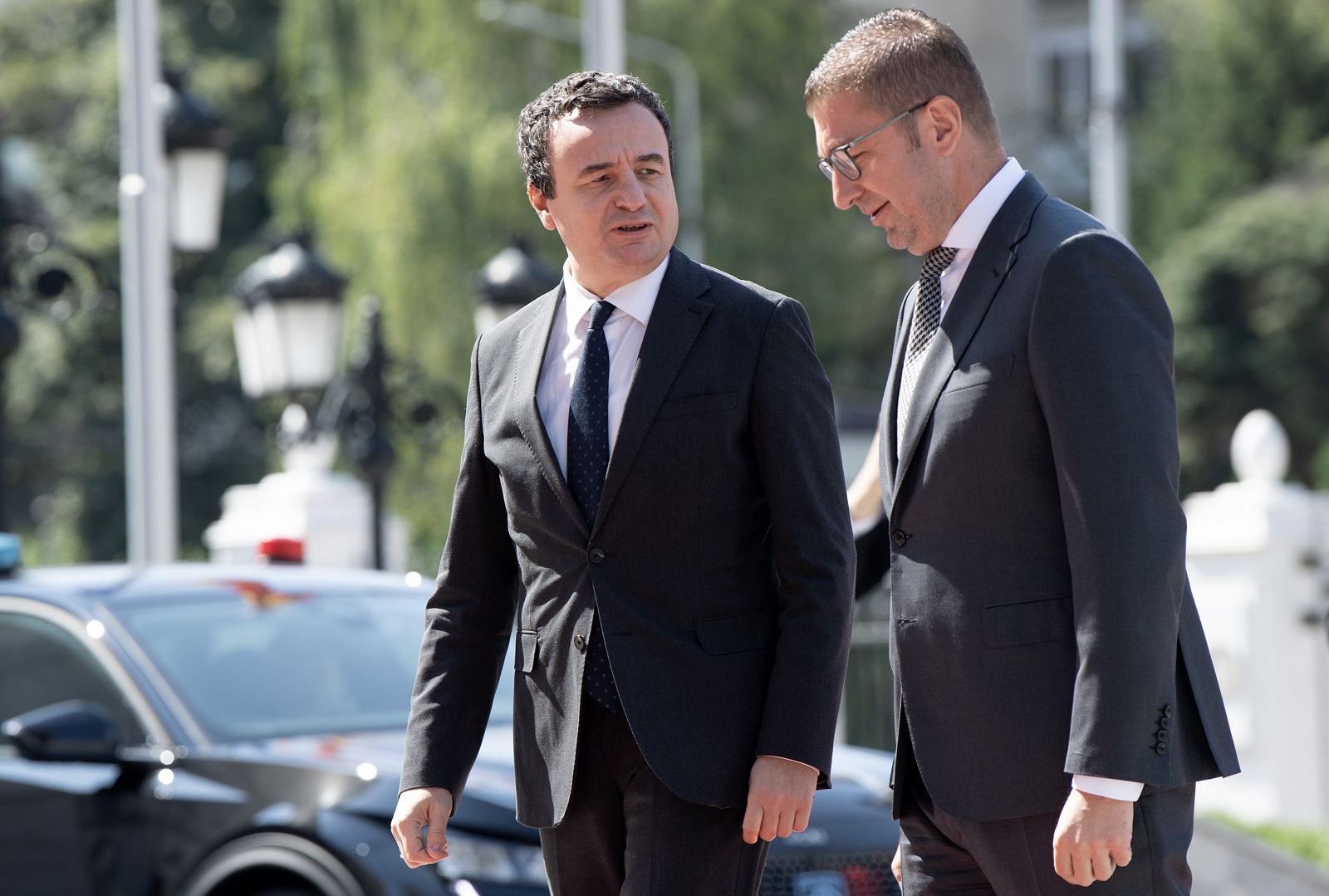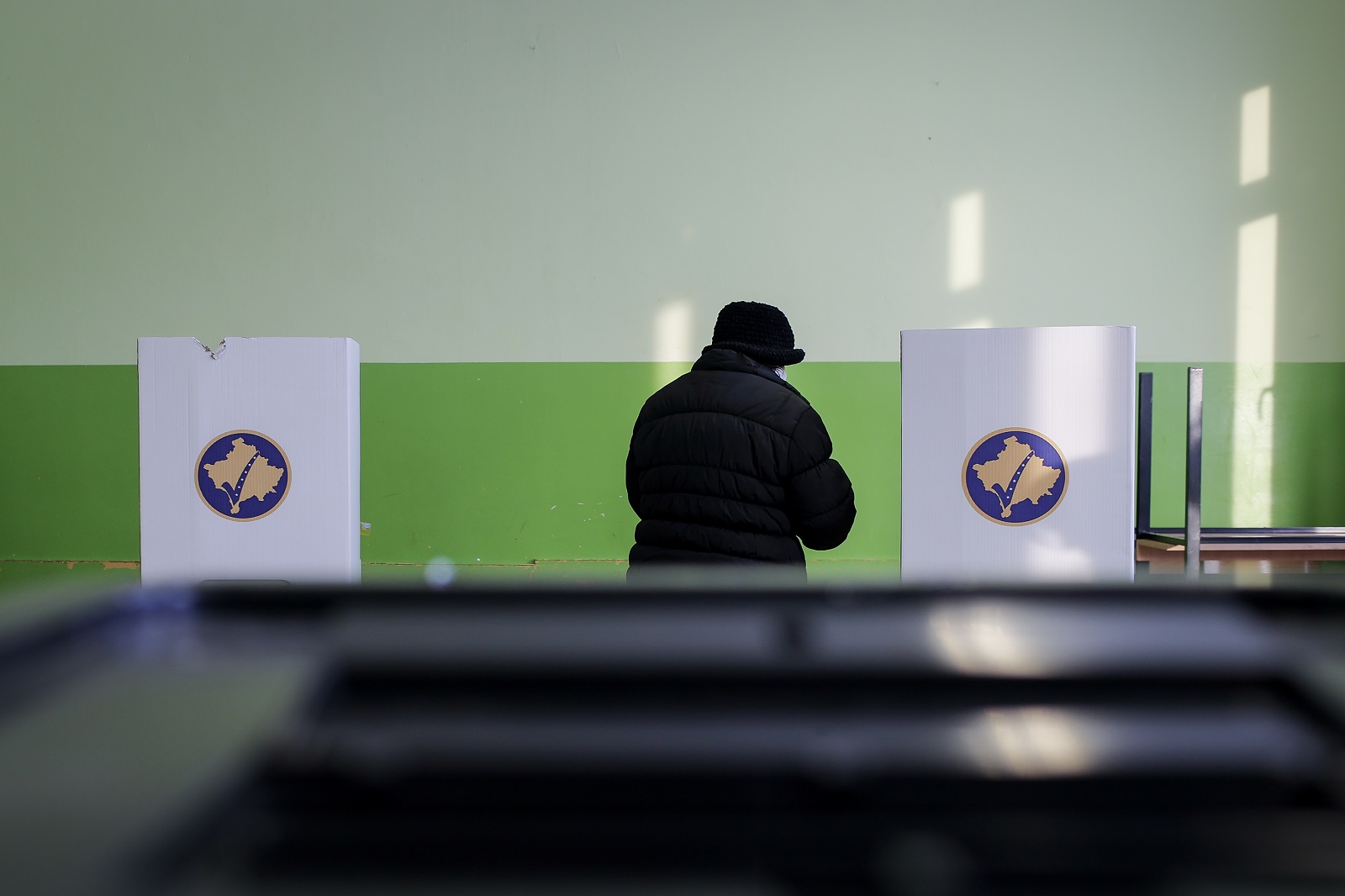An increase of disinformation is seen in Kosovo and North Macedonia before elections, which experts claim can influence the results, incite hatred, and manipulate political opinions of the public.
On the eve of Kosovo’s February 9, 2025, parliamentary elections, the country has been exposed to a series of disinformation related to key political figures in the country. Leaders, including members of political parties, were accused of false statements; their personas were used to fabricate statements made in the past to relate to the current political situation in the country.
On December 12, 2024, just a few hours before political parties’ deadline to submit their candidates’ list to the Central Election Commission,a Kosovo local Albanian language media, Klan Kosova, published a news article claiming that Besarta Jashari, the daughter of the Kosovo national hero Hamëz Jashari, will be an MP candidate for ruling Vetëvendosje Movement. The news was soon republished in at least a dozen news portals.
BIRN Kosovo and Internews Kosovo fact-checking and debunking platform, Krypometër, concluded that the news was false. Her brother, Bekim, had written on Facebook that “our family remains steadfast in its position to stay out of active involvement in political parties and electoral processes, maintaining our commitment as impartial supporters of the development of our country.”
Vetëvendosje’s spokesperson, Arlind Manxhuka, also debunked the news on his personal Facebook account.
Krypometër went further, analysing the Vetëvendosje MP candidates list, which was published on December 12, 2024 a few minutes after midnight. Besarta Jashari is not on the list.
As Kosovo approaches the February 9, 2025, parliamentary elections, the impact of disinformation remains a pressing concern, especially considering the influence that fake news from Kosovo and the rest of the Western Balkans had in North Macedonia’s parliamentary and presidential elections in April and May 2024.
Throughout parliamentary and presidential elections in North Macedonia held in April and May of 2024, there was an influx of disinformation, which was mainly related to interethnic relations and ethnocentric rhetoric. This disinformation ultimately influenced both the atmosphere and the results of the elections.
Experts told BIRN that the spread of disinformation before elections has become common, sometimes directly influencing public opinion.
Even during election day in North Macedonia, on April 24, some media reported an exit poll that predicted the outcome of the elections, even though no organization or media had reported such a poll being conducted.
Petrit Saracini, editor-in-chief of North Macedonia’s Institute for Media and Analytics, IMA, told BIRN that “these disinformation tactics were used by various political actors to claim victory or loss in the elections”.
According to him, such disinformation and propaganda increased support for parties that positioned themselves against the Prespa Agreement, a 2018 deal with Greece facilitated by the UN that resolved a name dispute between the two countries. It also increased the support for parties that were against the so-called French Proposal, which partially unblocked the process of starting the EU negotiations for North Macedonia.
Alban Zeneli, professor of Journalism at the University of Prishtina emphasizes that the techniques for the spread of disinformation before elections in Kosovo are focused on polarizing society.
“The main idea has been to divide society into pro and anti about one issue or another, without detailing the arguments why you should be pro or anti a political party or a political idea,” he told BIRN.
Neighbouring interest in North Macedonia’s elections boosts disinformation

North Macedonia’s Prime Minister Hristijan Mickovski (R) welcomes Kosovo’s Prime Minister Albin Kurti (L) in Skopje, Republic of North Macedonia, August 5, 2024. Photo: EPA-EFE/GEORGI LICOVSKI
The neighboring countries have always had an interest in Macedonia’s political scene, and they have even indirectly impacted the outcomes by supporting certain political parties.
Such an example is Albanian Prime Minister, Edi Rama declaring Ali Ahmeti, the leader of the Democratic Union for Integration (DUI), an honorary citizen of Tirana right before the Macedonian parliamentary elections in May 2024.
It remains quite unusual for a party from another country to directly participate in North Macedonia’s elections. Therefore, Kosovo PM Albin Kurti’s party Vetevendosje’s participation in the elections in North Macedonia as part of the “Vlen” coalition caused an increased interest from Kosovar media.
According to Sefer Tahiri, a North Macedonia-based university professor of journalism and expert on media literacy, the journalists from Kosovo who went to North Macedonia to report on the elections were objective, however, the local Macedonian broadcaster Klan Macedonia was perceived as biased for hosting them.
Nonetheless, some media outlets in North Macedonia used this support of Kurti to argue that it was interfering in North Macedonia’s internal affairs.
Sarachini argues that “this led to mutual attacks within the Albanian political camp, questioning who is more patriotic or who is a traitor, who supports Russia or opposes Russia, creating confusion among voters and making it harder for them to make an informed choice.”
Disinformation did indeed increase. Just two days before the double elections in North Macedonia, a local journalist published a video on Facebook, in which he claimed that the Glauk Konjufca, Kosovo Parliament speaker from Kurti’s Vetevendosje, said that any cooperation with the Macedonian political party, VMRO-DPMNE, is anti-Albanian.
Almost immediately after, Ilir Kërçeli, Konjfuca’s advisor, responded by asking the journalist to publish the whole unedited video because Konjufca’s statement was edited out of context.
Konjufca’s actual statement was: “I have followed VMRO’s candidate for President of North Macedonia. The concepts she explained during the campaign are anti-Albanian. I don’t think such an option should be supported.”
The situation arose when the media in North Macedonia reported that the leader of VMRO-DPMNE, Hristijan Mickoski, met with Arben Taravari, one of the leaders of the “Vlen” coalition. This meeting hinted at a possible coalition between the two political parties after the elections.
Thus, the manipulation of Konjufca’s statement could have impacted the election process because “Vetevendosje,” the political party that he represents in Kosovo, is also one of the four political parties in the “Vlen” coalition.
Direct praises or attacks dominate Kosovo’s virtuality before elections

A Kosovo Serb woman prepares to vote at a voting center in Gracanica, Kosovo, February 14, 2021. Photo: EPA-EFE/VALDRIN XHEMAJ
Kosovo’s February 14, 2021, parliamentary elections saw an increase in Facebook groups and accounts and/or online portals sharing content that praised or degraded political figures.
“The main idea has been to divide society into pro and anti about one issue or another, without detailing the arguments why you should be pro or anti a political party or a political idea,” Zeneli, Kosovo-based professor of journalism told BIRN.
Zeneli mentions the Facebook group “MeKryeministrin [with the Prime Minister],” that went viral in 2021, before the extraordinary parliamentary elections.
There were two main fronts of disinformation Zeneli told BIRN. “The first main front was in promoting the figure of [current] Prime Minister Kurti, often without facts, and the second front was attacking political opponents with half-truths and various manipulations of information,” Zeneli explained.
According to him, the same trend continued during the local elections, later in 2021, with a lower intensity of spreading disinformation.
Venera Gashi, from the Kosovo-based think tank Democracy for Development, D4D, told BIRN they monitored online portals, social media, and senior representatives of political entities during the two rounds of local elections in 2021.
“During the analysis of 6,038 articles, 180 articles and posts in the Albanian language contained disinformation generating 219,397 interactions on social media and potentially reaching 4,954,302 people who could have read these articles and posts,” Gashi explained.
Gashi emphasized that political divisions, hate speech, and exaggerated headlines dominated the manipulative content.
“In the Albanian-language sample, during the election campaign, articles and posts with disinformation were dominated by articles promoting political divisions, accounting for 36 percent, followed by harsh and offensive language with 34 percent and exaggerated headlines with 23 percent, while fully false news articles comprised 7 percent of the monitored articles,” she added.
However, Zeneli believes that fact-checking efforts have intensified.
“As of 2021, we have two member organizations in [International Fact-Checking Network] IFCN, Krypometer and Hibrid.info,” Zeneli pointed out, noting that while their work is important, the problem is the two are not very popular among the public, so not many people use them as channels for their information.
“This does not mean that the work of fact-checkers is unimportant in our society, on the contrary, I think it is more necessary and important than ever before, due to the fact that we are seeing that misinformation is gaining ground in distribution, at least people who want to verify such things have credible addresses with which they can get informed,” Zeneli explained.
“We don’t know for sure who is behind the portals since many of them disappear and reappear only during elections, but it is worth noting that they target candidates by releasing information that is not related to the elections and only has negative elements against a certain candidate,” Gashi said.
Nonetheless, fake news can have a big influence on the public. According to Zeneli, people who receive biased, unbalanced, and deliberately manipulated information, have a “political behavior [that] is not based on facts, it is based on lies.”
Gashi believes that fake news “brings us to the problem of the use of hate speech against political figures on social networks, and it is not by chance that such news comes out during elections, to influence public opinion. Of course, news that goes viral and is also distributed by many other portals can affect the outcome of the vote.”
Zeneli stressed that the Ministry of Education should urgently change the subject of “Media Education” from an elective subject into a mandatory subject in the pre-university system.
“Meanwhile, civil society and certain social groups of non-governmental activities should target people who are not in school but who need to acquire new skills in judging media content,” he added.





